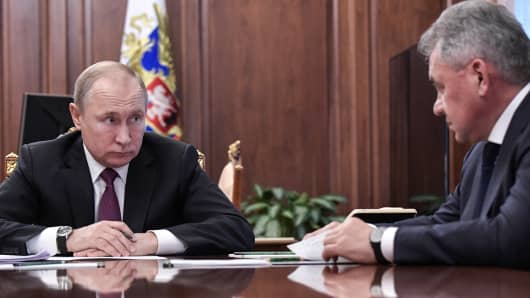Russian Defense Minister Sergei Shoigu said his country should develop new ground-based hypersonic and cruise missiles in a direct response to the apparent ending of a nuclear treaty between Washington and Moscow.
On Friday, the U.S. confirmed it would suspend its participation in the decades-old Intermediate-Range Nuclear Forces (INF) treaty that bans ground-launched medium-range missiles with a range of 310-3,400 miles. The U.S. administration said it had taken the measure following Russia’s refusal to accept that its SSC-8 missile directly contravenes the Cold War-era agreement
By Saturday, Russian President Vladimir Putin reacted by also halting his country’s obligations to the treaty.
Speaking to media, Putin said Russia would provide a “mirror like response” to the U.S. by engaging in fresh research and development for nuclear missile technology but would not “get involved in a costly arms race.”
According to state media outlet RIA, Shoigu said Tuesday that given the treaty was no longer being observed, it was now important to increase Russia’s range of land-based missile systems within the next two years.
“In 2019-2020, we should develop a ground-based version of sea-based Kalibr complexes with a long-range cruise missile, which has proved to be effective in Syria. During the same period, we should create a ground-based missile complex with a long-range hypersonic missile,” Shoigu said.
The Kalibr missile family differs in size, launch platform, range, and speed but can all pack either a conventional warhead or nuclear payload.
The INF treaty was signed in 1987 by then President Ronald Reagan and Soviet leader Mikhail Gorbachev. The agreement forced both countries to dismantle more than 2,500 missiles.
Now that both countries have suspended it, the treaty will expire in six months if Washington and the Kremlin cannot find agreement. A separate 2010 “New START” (Strategic Arms Reduction Treaty) arrangement, which seeks to limit nuclear missile launchers and improve inspections, could also fall by the wayside when its terms expire in 2021.
The rise of China, North Korea
Angela Kane, a senior fellow at the Vienna Center for Disarmament and Non‑Proliferation, said the U.S. could be stopping bilateral nuclear arms accords because it sees them as restrictive when competing with other emerging rivals.
“I’m guessing here, but I’m extrapolating that the U.S wants to develop missiles that could also be directed against China or other countries such as Iran or North Korea,” she said on a panel titled “Nuclear Brinkmanship” at the World Economic Forum at Davos in January.
Kane added that with no INF agreement in place, many nuclear missiles could be deployed to any region around the world.








